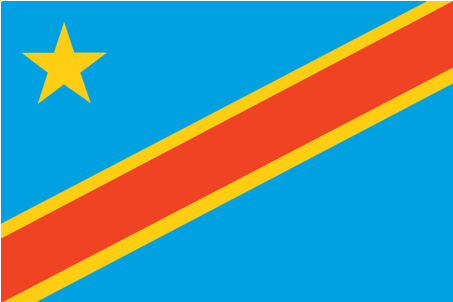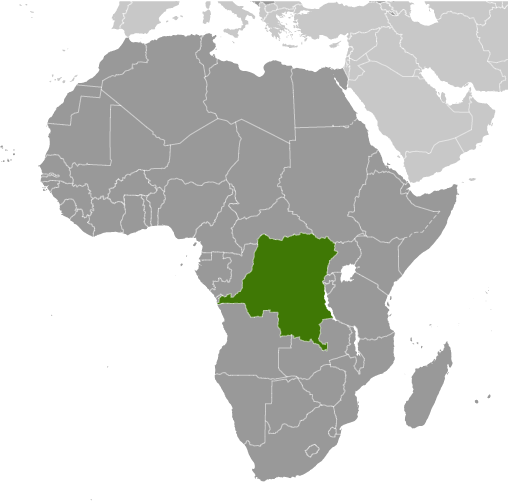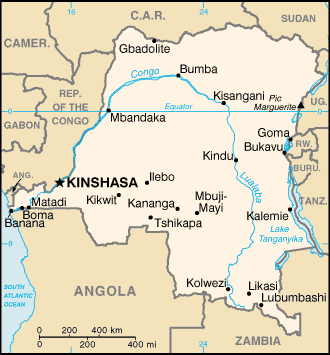Established as a Belgian colony in 1908, the Republic of the Congo gained its independence in 1960, but its early years were marred by political and social instability. Col. Joseph MOBUTU seized power and declared himself president in a November 1965 coup. He subsequently changed his name - to MOBUTU Sese Seko - as well as that of the country - to Zaire. MOBUTU retained his position for 32 years through several sham elections, as well as through brutal force. Ethnic strife and civil war, touched off by a massive inflow of refugees in 1994 from fighting in Rwanda and Burundi, led in May 1997 to the toppling of the MOBUTU regime by a rebellion backed by Rwanda and Uganda and fronted by Laurent KABILA. He renamed the country the Democratic Republic of the Congo (DRC), but in August 1998 his regime was itself challenged by a second insurrection again backed by Rwanda and Uganda. Troops from Angola, Chad, Namibia, Sudan, and Zimbabwe intervened to support KABILA's regime. A cease-fire was signed in July 1999 by the DRC, Congolese armed rebel groups, Angola, Namibia, Rwanda, Uganda, and Zimbabwe but sporadic fighting continued. Laurent KABILA was assassinated in January 2001 and his son, Joseph KABILA, was named head of state. In October 2002, the new president was successful in negotiating the withdrawal of Rwandan forces occupying eastern Congo; two months later, the Pretoria Accord was signed by all remaining warring parties to end the fighting and establish a government of national unity. A transitional government was set up in July 2003. Joseph KABILA as president and four vice presidents represented the former government, former rebel groups, the political opposition, and civil society. The transitional government held a successful constitutional referendum in December 2005 and elections for the presidency, National Assembly, and provincial legislatures in 2006. The National Assembly was installed in September 2006 and KABILA was inaugurated president in December 2006. Provincial assemblies were constituted in early 2007, and elected governors and national senators in January 2007.
Population
70,916,439
Country comparison to the world:18
note:estimates for this country explicitly take into account the effects of excess mortality due to AIDS; this can result in lower life expectancy, higher infant mortality, higher death rates, lower population growth rates, and changes in the distribution of population by age and sex than would otherwise be expected (July 2010 est.)
Nationality
Noun: Congolese (singular and plural)
Adjective:Congolese or Congo
Ethnic groups
over 200 African ethnic groups of which the majority are Bantu; the four largest tribes - Mongo, Luba, Kongo (all Bantu), and the Mangbetu-Azande (Hamitic) make up about 45% of the population
Religions
Roman Catholic 50%, Protestant 20%, Kimbanguist 10%, Muslim 10%, other (includes syncretic sects and indigenous beliefs) 10%
Languages
French (official), Lingala (a lingua franca trade language), Kingwana (a dialect of Kiswahili or Swahili), Kikongo, Tshiluba
Country Name
Conventional long form:Democratic Republic of the Congo
Conventional short form: DRC
Local long form:Republique Democratique du Congo
Local short form:RDC
Former:Congo Free State, Belgian Congo, Congo/Leopoldville, Congo/Kinshasa, Zaire
abbreviation:DRC
Government Type
republic
Capital
Name:Kinshasa
Geographic coordinates: 4 19 S, 15 18 E
Time difference:UTC+1 (six hours ahead of Washington, DC during Standard Time)
Administrative divisions
10 provinces (provinces, singular - province) and 1 city* (ville); Bandundu, Bas-Congo, Equateur, Kasai-Occidental, Kasai-Oriental, Katanga, Kinshasa*, Maniema, Nord-Kivu, Orientale, Sud-Kivu
note: according to the Constitution adopted in December 2005, the current administrative divisions will be subdivided into 26 new provinces by 2009
Independence
30 June 1960 (from Belgium)
National Holiday
Independence Day, 30 June (1960)
Constitution
18 February 2006
Legal system
civil law based on Belgian law with Napoleonic Civil Code influence; accepts compulsory ICJ jurisdiction with reservations
Suffrage
18 years of age; universal and compulsory
Executive branch
Chief of state: President Joseph KABILA (since 17 January 2001);
Head of government:Prime Minister Adolphe MUZITO (since 10 October 2008)
Cabinet:Ministers of State appointed by the president
(For more information visit the World Leaders website)
Elections:under the new constitution the president elected by popular vote for a five-year term (eligible for a second term); elections last held on 30 July 2006 and on 29 October 2006 (next to be held in October 2011); prime minister appointed by the president
Election results:Joseph KABILA elected president; percent of vote (second round) - Joseph KABILA 58%, Jean-Pierre BEMBA Gombo 42%
note: Joseph KABILA succeeded his father, Laurent Desire KABILA, following the latter's assassination in January 2001; negotiations with rebel leaders led to the establishment of a transitional government in July 2003 with free elections held on 30 July 2006 and a run-off on 29 October 2006 confirming Joseph KABILA as president
Legislative branch
bicameral legislature consists of a Senate (108 seats; members elected by provincial assemblies to serve five-year terms) and a National Assembly (500 seats; 61 members elected by majority vote in single-member constituencies, 439 members elected by open list proportional-representation in multi-member constituencies to serve five-year terms)
Elections:Senate - last held on 19 January 2007 (next to be held by 2012); National Assembly - last held on 30 July 2006 (next to be held in July 2011)
Election results:Senate - percent of vote by party - NA; seats by party - PPRD 22, MLC 14, FR 7, RCD 7, PDC 6, CDC 3, MSR 3, PALU 2, independents 26, others 18 (political parties that won a single seat); National Assembly - percent of vote by party - NA; seats by party - PPRD 111, MLC 64, PALU 34, MSR 27, FR 26, RCD 15, independents 63, others 160 (includes 63 political parties that won 10 or fewer seats)
Judicial branch
Constitutional Court; Appeals Court or Cour de Cassation; Council of State; High Military Court; plus civil and military courts and tribunals
Political Parties and Leaders
Christian Democrat Party or PDC [Jose ENDUNDO]; Congolese Rally for Democracy or RCD [Azarias RUBERWA]; Convention of Christian Democrats or CDC; Forces of Renewal or FR [Mbusa NYAMWISI]; Movement for the Liberation of the Congo or MLC [Jean-Pierre BEMBA]; People's Party for Reconstruction and Democracy or PPRD [Joseph KABILA]; Social Movement for Renewal or MSR [Pierre LUMBI]; Unified Lumumbist Party or PALU [Antoine GIZENGA]; Union for Democracy and Social Progress or UDPS [Etienne TSHISEKEDI]; Union of Mobutuist Democrats or UDEMO [MOBUTU Nzanga]
Political pressure groups and leaders
MONUC - UN organization working with the government; FARDC (Forces Arm es de la R publique D mocratique du Congo) - Army of the Democratic Republic of the Congo which commits atrocities on citizens; FDL (Forces Democratiques de Liberation du Rwanda) - Rwandan militia group
International organization participation
ACCT, ACP, AfDB, AU, CEPGL, COMESA, FAO, G-24, G-77, IAEA, IBRD, ICAO, ICCt, ICRM, IDA, IFAD, IFC, IFRCS, IHO, ILO, IMF, IMO, Interpol, IOC, IOM, IPU, ISO, ITSO, ITU, ITUC, MIGA, MINURCAT, NAM, OIF, OPCW, PCA, SADC, UN, UNCTAD, UNESCO, UNHCR, UNIDO, UNWTO, UPU, WCO, WFTU, WHO, WIPO, WMO, WTO
Diplomatic representation in the US
Chief of mission:Ambassador Faida MITIFU
Chancery:Suite 601, 1726 M Street, NW, Washington, DC, 20036
Telephone:[1] (202) 234-7690 through 7691
FAX: [1] (202) 234-2609
Diplomatic representation from the US
Chief of mission: Ambassador William GARVELINK
Embassy:310 Avenue des Aviateurs, Kinshasa
Mailing address: Unit 31550, APO AE 09828
Telephone: [243] (81) 225-5872
FAX:[243] (81) 301-0561
Flag description
sky blue field divided diagonally from the lower hoist corner to upper fly corner by a red stripe bordered by two narrow yellow stripes; a yellow, five-pointed star appears in the upper hoist corner; blue represents peace and hope, red the blood of the country's martyrs, and yellow the country's wealth and prosperity; the star symbolizes unity and the brilliant future for the country










